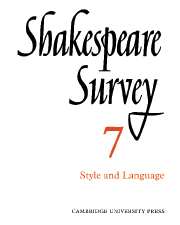Book contents
- Frontmatter
- Fifty Years of the Criticism of Shakespeare’s Style: A Retrospect
- Shakespeare and Elizabethan English
- The Poet and the Player
- Shakespeare’s Orthography in Venus and Adonis and Some Early Quartos
- The New Way with Shakespeare’s Texts: An Introduction for Lay Readers. I. The Foundations
- The Red Bull Company and the Importunate Widow
- Vaulting the Rails
- Shakespeare and the Acting of Edward Alleyn
- The Birmingham Shakespeare Memorial Library
- Shakespeare’s Italy
- International Notes
- Shakespeare Productions in the United Kingdom: 1952
- Acting Shakespeare: Modern Tendencies in Playing and Production
- The Year's Contributions to Shakespearian Study 1 Critical Studies
- 2 Shakespeare’s Life, Times and Stage
- 3 Textual Studies
- Books Received
- Index
- Plate Section
The Year's Contributions to Shakespearian Study 1 - Critical Studies
Published online by Cambridge University Press: 28 March 2007
- Frontmatter
- Fifty Years of the Criticism of Shakespeare’s Style: A Retrospect
- Shakespeare and Elizabethan English
- The Poet and the Player
- Shakespeare’s Orthography in Venus and Adonis and Some Early Quartos
- The New Way with Shakespeare’s Texts: An Introduction for Lay Readers. I. The Foundations
- The Red Bull Company and the Importunate Widow
- Vaulting the Rails
- Shakespeare and the Acting of Edward Alleyn
- The Birmingham Shakespeare Memorial Library
- Shakespeare’s Italy
- International Notes
- Shakespeare Productions in the United Kingdom: 1952
- Acting Shakespeare: Modern Tendencies in Playing and Production
- The Year's Contributions to Shakespearian Study 1 Critical Studies
- 2 Shakespeare’s Life, Times and Stage
- 3 Textual Studies
- Books Received
- Index
- Plate Section
Summary
“Probably”, says R. W. Babcock, “the most important type of modern criticism of Shakespeare is historical criticism.” There is indeed no denying that it can help us to understand the meaning of the plays; but when he goes on to describe it as a co-operative activity, as if all its practitioners were at one in their methods and aims, and to speak as if our knowledge of the Elizabethan scene were growing ever surer, we must marvel at his ability to reconcile contradictions and to give his blessing to conjecture. Such claims, too, may overlook the special contribution made to his immediate world by any artist of stature: he will inevitably think in terms of that world, and if he is a dramatist he must work through other men, his actors, whose responses are not likely to be much out of the ordinary; he must offer an interpretation of living that can be graspable, if not fully comprehensible, to an audience haphazardly assembled; but ultimately he will possess standing because he is not quite as others are. He will offer more than is expected, more perhaps than his very interpreters realize. In the last few years a remembrance of this may have led us to some loss of faith in ‘historical criticism’. In so far as it establishes fact (as, for example, in the history of the dramatic companies), or cogently suggests the prevalence of certain thought-patterns or forms of technique, we do of course still welcome it with full hearts. Yet we come also to value the critics who use these findings while at the same time realizing that Shakespeare is so much our concern because of his difference from his fellows, that he is not merely a skilled expositor of current Elizabethan notions, that no single critic can tell us all that the plays contain.
- Type
- Chapter
- Information
- Shakespeare Survey , pp. 128 - 138Publisher: Cambridge University PressPrint publication year: 1954



